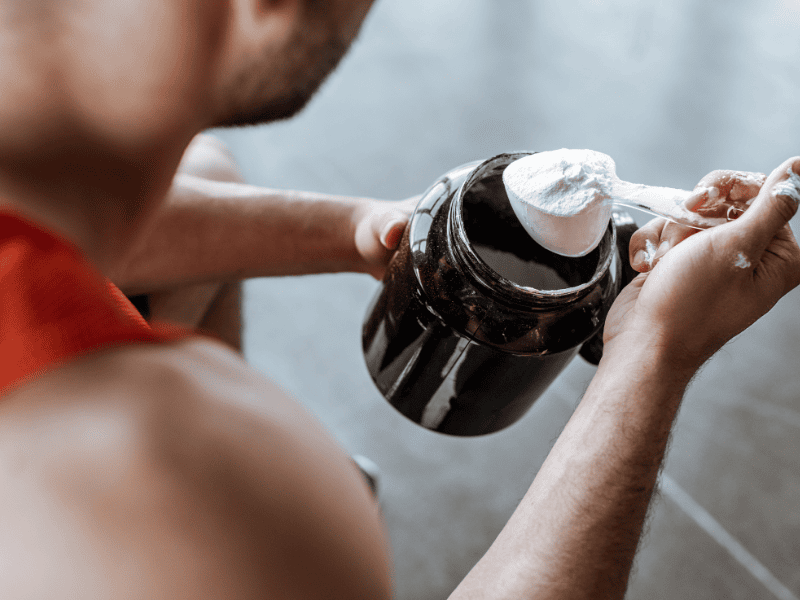
“I feel so rundown.”
“I’m tired all the time. I haven’t been sleeping, and when I roll, I get cramps everywhere. The next day after class, my whole body hurts.” I guess that means I’m getting old or something, right?” Have you heard comments like these from students in your gym? .
Is this really the problem?
What if your students aren’t dealing with old age? What if they’re dealing with deficiencies in their diet? If you could help students eliminate these problems with supplements and increase your revenue at the same time, would you do it?
The Pros and Cons of Selling Supplements in Your Jiu Jitsu Academy
Should you do it?
Is it a good idea to sell supplements in your gym?
On one hand, supplements mean more revenue for your business. On the other hand, there are new risks—regulatory, liability, safety, and ethical—that you’ll need to navigate safely for your students and your business.
Is it worth it?
Here’s a quick look at the pros and cons of selling supplements to your students.
Is selling supplements worth it then?
Why Consider Selling Supplements at Your Jiu Jitsu Academy?
What are some of the motivations gym owners have for selling supplements?
- Revenue growth and diversification: When your business relies exclusively on the membership hamster wheel, your business is vulnerable to churn, local competition, and seasonal fluctuations as students come and go. Supplement sales can be a stable and profitable stream of revenue that helps to stabilize your cash flow.
- Member convenience: Your students already like and trust you. They also need supplements to maintain their level of activity. Ordering their supplements from you is a convenient and easy way to get the products they need and are already using.
- Community building: Your gym fosters a stronger sense of community as students share their stories, discuss nutrition, provide details on their supplement stacks, and offer recommendations. This reinforces your academy as a community and your students' place in that community. Over time, students begin to see you as a trusted and credible resource for their athletic goals.
- Brand extension: If your academy is already seen as a trusted source for athletic performance and recovery, supplement sales help to reinforce that positioning, so long as your product quality is high. The more consistent your brand, the more benefits your academy receives.
The profit potential and rewards are significant, but they’re not without risks. If you’re going to sell supplements, focus on: (a.) meeting (exceeding) compliance requirements, (b.) sourcing and selling high-quality products to students in your academy, and (c.) taking care of the nutritional needs of your students and athletes.
Nutritional Needs of BJJ Practitioners
Brazilian jiu jitsu is fast-paced, high-intensity, full-body grappling. When you’re training, you’re:
- Working through high-effort intervals (e.g., drilling, positional rounds, rolling)
- Applying Isometric contractions, experiencing joint stress, and eccentric loading
- Attending frequent sessions (e.g., 2 - 20 per week)
As a practitioner, you’re experiencing a significant amount of stress on your body—metabolic stress, muscle damage, and macronutrient depletion. Nutrition, sleep, and recovery are essential, but training depletes these. The question is not whether your students need supplements, but how much and when.
Let’s get the obvious stuff out of the way.
- Food is best: A balanced diet with the right mix of proteins, carbohydrates, and fats should be the cornerstone for your supplementation needs. If you’re training hard, good food, hydration, and sleep are the foundation.
- Supplements fill the gaps: It can be difficult to eat enough food items needed during the day to meet your training and recovery needs. Supplementation is an important tool that students and athletes can use to supplement their diets.
- Start with the Big 3 Supplements: What are the Big 3 supplements? It’s a useful heuristic shared in the fitness and strength communities is to build around the “Big 3” supplements. While there’s considerable disagreement on which supplements make up the Big 3, one of the more common mixes includes protein to aid recovery, creatine to boost size and strength, and various vitamins.
- Add more supplements as needed: Athletes tend to struggle with deficiencies in the same areas—iron, iodine/iodide, magnesium, zinc/copper, omegas, etc. If you build around the Big Three, you’ll find it’s easier to support students with the right supplements.
It’s important to address the risks you face ahead of time; if the demand is there, it may align with your needs and revenue goals. Just make sure you’re offering the supplements your students actually want/need.
Key Supplement Categories BJJ Students Ask For
Here’s a list of the most common supplements used by students in Brazilian Jiu Jitsu.
What about the types of supplements you offer?
Take protein, for example.
Your students want to know—what’s the best protein for jiu jitsu? You’ll want to offer several types of protein to accommodate the needs and requirements of your students. What would this look like?
- Whey: It’s a fast-digesting protein you can use post-workout to increase your amino acid uptake.
- Casein: slower digesting—this protein is useful, especially if it’s taken before bedtime, supplying your body with what it needs during your overnight recovery.
- Plant proteins: pea, rice, hemp, soy, and other blends. These are especially helpful for vegans and those who are lactose intolerant.
See what I mean?
If you’re offering supplements to your students, you’ll want to provide them with the product type that works best for them. You don’t need to accommodate absolutely everyone, but it’s important to have options for the vast majority of students in your academy.
Typical pricing and profit margin
A quick search on Google shows that the price for a tub of protein ranges from $30 to $80, depending on the specific size and formulation of each product. If you decide to offer your supplements to students at wholesale prices or discounted rates, you provide students with a greater incentive to purchase what they need from you instead of a third party.
Supplement Concerns
As a retailer, there are several areas that need your attention, especially if you’re focused on maintaining quality and strengthening your relationships with your students.
- Many supplements use “proprietary blends” with unclear dosages/ingredients
- These supplements are often not tested before they go to market
- Some poor-quality supplements may include stimulants or ingredients that may negatively impact your health
- Untested products can be contaminated with harmful substances (e.g., heavy metals, pesticides, or unlisted prescription drugs)
- Inaccurate labeling means the actual ingredients or potency of supplements may not match the label
If you’re going to sell supplements, you’ll want to verify that the products you sell avoid each of the problems I’ve just mentioned. From a legal or liability standpoint, the more upfront research you spend on the products you sell, the better.
Possible Risks and Liability Concerns
If you’re going to sell supplements, be aware of the risks. Those who fail to do their homework face severe legal, regulatory, and medical liability issues.
Let’s take a look at these.
Legal and Regulatory Considerations
- In the United States, dietary supplements are regulated much more loosely than pharmaceuticals. The government treats supplements as “foods” under the law. Things get dicey when claims of efficacy (e.g., “this cures inflammation and joint pain”) are made. When this happens, it can push specific products into drug territory.
- As a fitness professional, if you decide to recommend or prescribe supplements to your students, you may inadvertently cross into “medical or dietetics scope of practice,” which, depending on your country or state, can be illegal or unethical.
- To complicate things further, if one of your students experiences an adverse reaction, you, as the supplier or seller, may be held liable under product liability laws.
Limiting Liability and Risk Mitigation
- Insurance coverage: If you’re going to sell supplements, product liability insurance is an absolute must. You’ll also want to verify that your general liability policy states explicitly that it covers supplement sales.
- Disclaimers: Disclaimers should be clearly displayed on your website, in marketing materials, and on product labels. These disclaimers should indicate that your supplements are not intended to diagnose, treat, cure, or prevent diseases (per FDA requirements) and that individual results may vary.
- Record keeping: Follow best practices by maintaining an ongoing record of all batch or lot numbers, supplier documentation, and sales logs in case a supplier shares recalls or adverse events. An Electronic Batch Record (EBR) is an essential record-keeping tool. Top software tools include Qualio, Master Control, Azumuta, and Greenlight Guru.
- Don’t overstep scope: Never, ever promise cures, specific health outcomes, or performance beyond what the scientific literature supports. Do your best to stick to the facts and nothing more.
- Supplier contracts/warranties: Work with suppliers who will indemnify you (partially or completely) and require certification and authentication of third-party testing. This is yet another layer of protection that helps you identify poor-quality manufacturers and shield you from bad business practices.
If your suppliers aren’t willing to stand behind their products, that’s the best indication that they’re not an ideal supplier for your jiu-jitsu academy.

How to Select Quality Brands and Avoid Common Pitfalls
So, I haven’t scared you off, eh?
What’s that? You’re still interested in selling supplements in your gym, and you’d like to move forward? Well, I suppose that brings us to the next, most obvious question.
How do you find a quality supplier?
If you decide to move forward, it’s important to understand that your success or failure (disaster) depends on your ability to source, select, and curate quality suppliers. Notice that I didn’t say “curate” quality products. Sourcing quality products begins with sourcing quality manufacturers.
So how do you do that?
If you decide to proceed, the difference between success and disaster often lies in your ability to source, select, and curate quality suppliers. From there, finding quality products is easier.
Here are some resources you can use to get started:
- The Dietary Supplement Label Database: The National Institutes of Health's (NiH) Dietary Supplement Label Database (DSLD) includes current and historical label information from products marketed in the U.S.
- Dietary Supplement Ingredient Database: The Dietary Supplement Ingredient Database (DSID) provides estimated levels of ingredients in dietary supplement products sold in the United States.
- Consumer Lab: Claims to be “the leading provider of independent test results and information to help consumers and healthcare professionals identify the best quality health and nutrition products.” They publish their findings in their Product Reviews for their members, as a paid service.
- The NSF Certified Dietary Supplements: “the nation's first independent testing standard and product certification program strictly for dietary supplements. The program protects consumers by testing for harmful levels of contaminants and certifying that supplements contain the ingredients listed on the label and nothing else.”
- The NSF Certified for Sport: According to their website, “The program certifies that what is on the label is in the package and that the product does not contain unsafe levels of contaminants, prohibited substances or masking agents.”
- Informed Choice: Their website states that Informed Choice is “a global quality assurance and third-party supplement testing program, designed to minimize the risks of dietary supplement products from being inadvertently contaminated with prohibited and potentially harmful substances.”
- USP Verified Products: “More than 100 different dietary supplement formulas have received the USP Verified Mark. USP Verified Products are sold at major retailers, grocery stores, pharmacies, and wholesale retailers across the U.S., as well as online through product websites.”
Why are sites like these important when sourcing supplement manufacturers?
1. Verified Testing and Third-Party Certifications
When you’re training serious students and competitive athletes, verified testing and third-party certifications are an absolute must. This reduces the risk of contamination or banned substances. The most respected seal is the “NSF Certified for Sport”, which verifies:
- No banned substances (290+ tested)
- Label accuracy verifying that what’s on the label is in the bottle
- Independent facility audits and contaminant testing
Here’s why this is important.
USADA recognizes NSF Certified for Sport as a top-level standard for athletes seeking to avoid doping accusations and eliminate doping risk.
Why does that matter?
The IBJJF relies on USADA to conduct doping control at its events. Say what you will about the IBJJF, if you’re serious about competing on a national stage, you’ll want to be at their events.
Other credible certification options include Choice, BSCG, and USP Verified.
2. Transparent Ingredient Labels and Clean Formulations
What to look for when you’re evaluating products.
- Avoid “proprietary blends” as they tend to obscure dosages
- Give preference to brands that offer full disclosure of each ingredient and dosage
- Avoid artificial colors, flavors, and unnecessary fillers
- Verify that allergen labeling is clearly listed (e.g., dairy, soy, gluten, nuts)
- Give preference to non-GMO or “clean” formulations
If you see any of these issues on any of the manufacturer’s product labels, that’s a serious red flag. The manufacturer’s products must be able to stand on their own.
3. Manufacturer Reputation and Quality Control
If you’re considering a particular manufacturer, you’ll want to vet them thoroughly.
- Get a list of their recall history, aggregate reviews, or customer complaints
- Ask for their recall policy and liability support
- Verify the manufacturer’s GMP (Good Manufacturing Practices) certification
- Request and analyze their “Certificates of Analysis (COAs)” for each lot or batch
- Observe your interactions with them; you want to see that they are responsive and transparent (how they sell you is how they serve you)
The absolute worst thing you can do is select a manufacturer based on margins, profits, and discounts. These items are secondary; trustworthiness, quality, and the willingness to stand behind their product are the foundation of their credibility.
Strategies to Educate Students and Build Trust
If you’re thinking about selling supplements, your primary focus shouldn’t be revenue. Your focus should be squarely set on your students.
- What are they struggling with (e.g., energy/fatigue, breathing issues, dehydration, recovery, etc.)?
- What they want to achieve (e.g., improving stamina, reducing fatigue, building muscle, faster recovery)?
- Special circumstances and preferences (e.g., allergies, vegan, gluten, etc.)
You must understand the goals and specific circumstances your students are dealing with. Yes, you need to make money, but that shouldn’t come at the expense of your students.
Here’s the problem.
Selling supplements in your academy will work best if you have your students’ buy-in. Okay, how exactly do you get your students to buy in?
You give them a chance to weigh in.
See that?
If your students aren’t given the chance to weigh in on the decision, they’re probably not going to buy into your decision to sell supplements. That’s important because you’re asking your students to eat the products you’ve recommended.
That’s a lot of trust you’re asking for.
That said, here are some practical methods you can use to earn buy in from your students.
1. Open Conversations & Educational Workshops
- Host nutrition webinars via Google Meet or supplement Q&As on Facebook
- Invite registered dietitians or sports nutritionists to present at your academy
- Show students your profit margins on your supplements
- Share evidence-based content; make sure it’s okay for students to ask questions and express skepticism
- Offer handouts, infographics, or reading lists with helpful content
- Don’t use high-pressure sales tactics to sell a product; you’ll most likely lose the sale and your students
Remember, your positioning is focused entirely on your students. Show them that you care about them, about their goals, and their health, and they’re much more likely to come on board.
2. Respecting Individual Preferences & Dietary Restrictions
It doesn’t matter how you sell it. Some students just won’t be interested in your supplements. If your primary focus is keeping them healthy and moving towards they’re goals, that should be okay.
- Keep vegan, gluten-free, and allergen-free options in stock
- Make sure your product and ingredient labels are clear and transparent
- Be welcoming and nonjudgmental toward students who choose not to use supplements (avoid making snide comments or harassing them about their decision)
- Teach interested students about the importance of whole-food nutrition
- Avoid pressure purchases
The more you respect your students’ autonomy and right to choose, the easier it is to protect their relationship with you.
Growing Your Academy With Smart Product Offerings
If you handle the rollout well, supplement sales can become a core part of your business, generating sizeable revenues.
If you’re looking to get started, follow best practices and start small.
Best practices to start small:
- Start with a few very high-quality staple products (remember the Big Three)?
- Survey the students in your gym. What problems are they dealing with that supplements can address?
- Who do they trust?
- Monitor product turnover and reorder schedules
- Use customer (student) demand to expand. Maintain strong supplier relationships
- Integrate with your marketing. Link your supplement sales to educational content (e.g., social media posts, blog, academy posters)
Start small, expand slowly.
FAQs About Selling Supplements at a Jiu Jitsu Academy
Answers to frequently asked questions about supplement sales.
Can I integrate supplement sales with gym management software?
Integrate your product and supplement inventory into your gym management software. If you’re using Gymdesk, you can manage and track your inventory, sales, student purchases, and even reporting. With Gymdesk, all of this is aligned with your billing and class schedules.
With Gymdesk, you can track your product inventory. This allows you to set the number of specific items you have in stock, and have the system deduct them as sales are made. Once the item, in this case supplements, runs out of stock, it won’t be available via your point-of-sale system or your online store.
How do I ethically market supplements to my jiu jitsu students?
Survey your students. Give your students the chance to weigh in so you can earn their buy in. Select products that are trustworthy and highly rated, via the metrics I’ve shared in this guide so far.
Orient your supplements around your students. Offer up as much education and transparency as they can handle. Avoid exaggerations and outlandish claims like the plague (e.g., this will cure your joints, cure your insomnia). Eliminate high-pressure sales tactics from your sales process—don’t pressure your students. Give them the facts, then step back and allow them to make an informed decision.
What if a student has an adverse reaction to a supplement I sold?
Follow best practices to address the issue.
- Maintain digital records with a list of suppliers and their batch/lot numbers
- Offer students a refund or exchange. Do your very best to act in good faith
- Recommend that your student seek medical attention and report the event
- Consult with your attorneys and insurer
- If advisable, issue a voluntary recall if/when a supplier defect is discovered
Do I need special licensing to sell supplements at my academy?
It all depends on your jurisdiction. Yes, it’s true that many areas treat supplements as “food items,” however, the rules vary from place to place.
So if you want to sell supplements in the U.S., your academy may need to get a general business license, a dietary supplement manufacturing license, FDA facility registration, and ensure compliance with Good Manufacturing Practices (cGMP). Here’s the thing: Federal, state, and local licensing requirements vary. But it’s your responsibility to understand the laws governing the safety of your supplements, labeling, and health claims in your marketing.
How much profit margin should I expect from supplement sales?
Profit margins on supplements vary quite a bit.
Estimates generally range from 30 to 60%, with the average in the United States being 38%. Your margins will vary by product type, brand, volume, and scale. If you’re selling protein, this tends to produce a 25 to 40% margin. However, specialty products like pre-workout and recovery shakes may make a 40 to 50% margin.
What does this mean?
When it comes to supplements, there’s a whole lot of revenue/profit to be made.
Is it a good idea to sell supplements in your gym?
On one hand, supplements generate more revenue for your business. On the other hand, there are new risks—regulatory, liability, safety, and ethical—that you’ll need to navigate safely for your students and your business.
Is it worth it?
It can be, if you make the right choices.
If you choose to move forward, start small. Identify trustworthy manufacturers who meet the criteria we’ve mentioned earlier in this guide, specifically for third-party tested products. Earn your students’ buy in by giving them a chance to weigh in. Encourage skepticism and lots of questions.
Allow your students to opt in on their own—don’t push them. With the right approach, you may find that supplement sales can become a trusted part of your academy’s identity rather than a liability; no student burnout or exhaustion required.
Gym management software that frees up your time and helps you grow.
Simplified billing, enrollment, student management, and marketing features that help you grow your gym or martial arts school.





